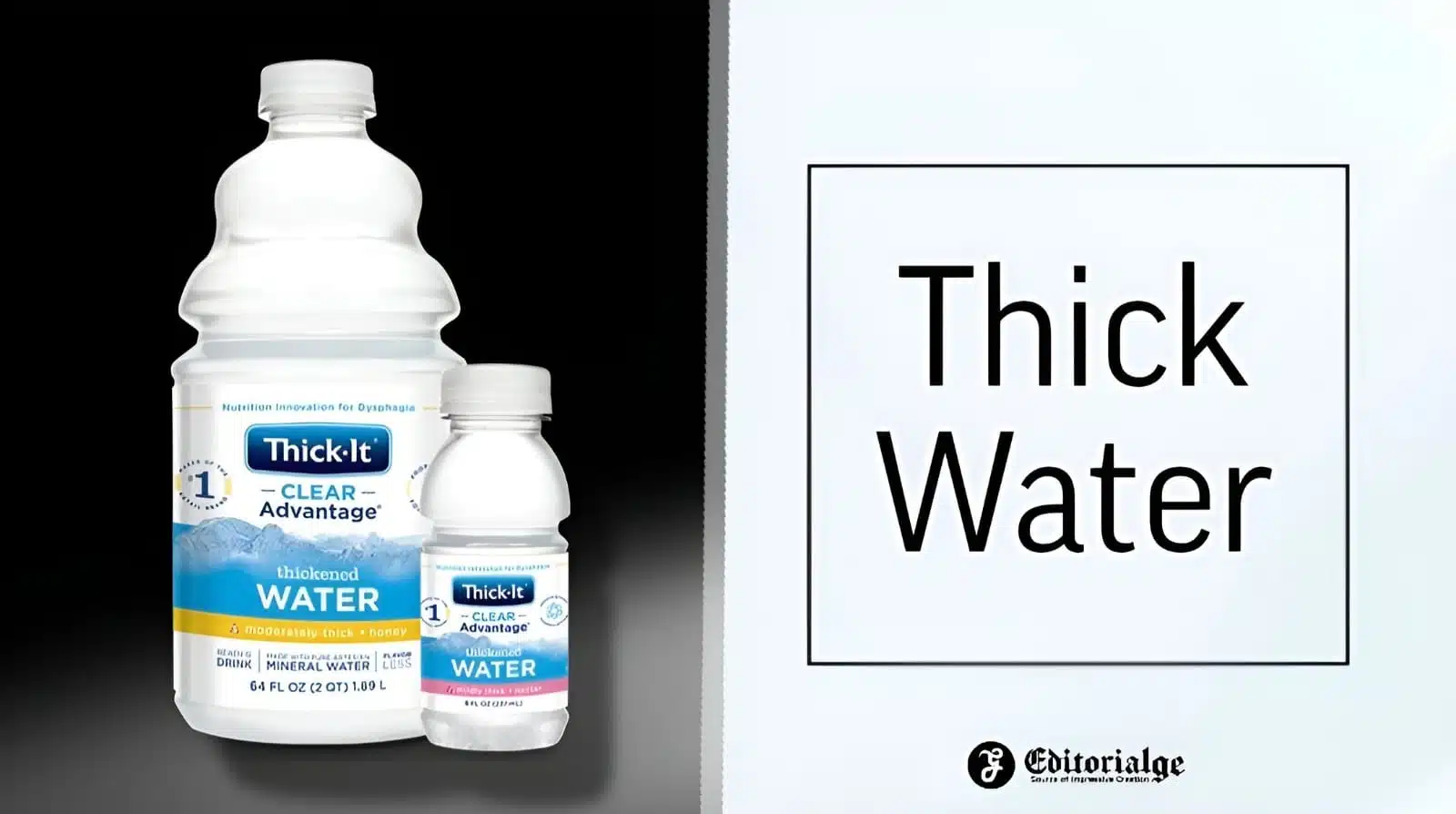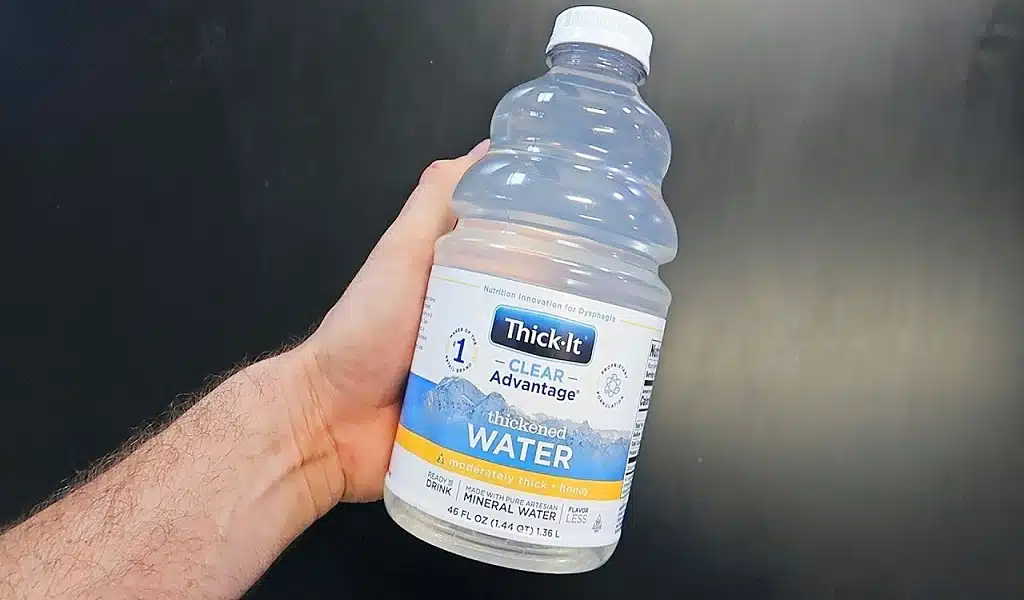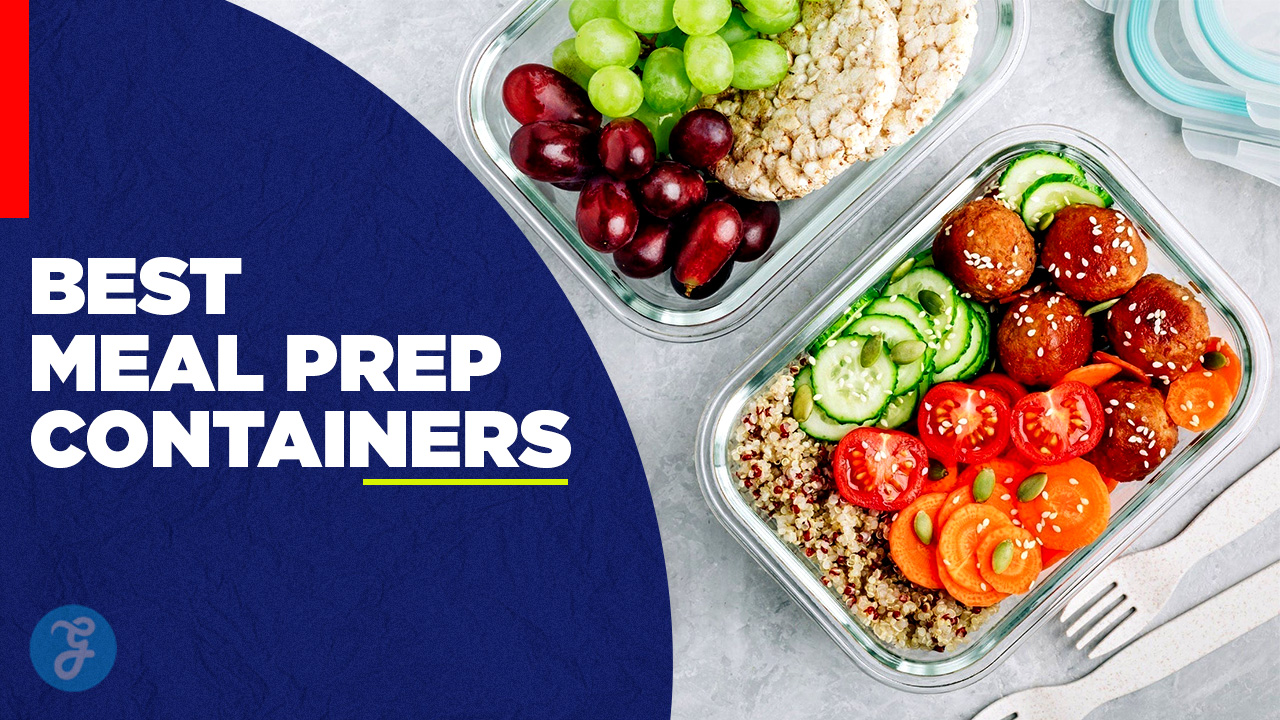Listen to the Podcast:
For the almost 13 million Americans who have trouble swallowing, drinking thick water is a safe and efficient approach to staying hydrated. It is possible to reduce the risk of coughing, choking, and aspiration pneumonia by increasing the viscosity of thin liquids such as tap water, fruit juice, and soda.
The 50 pairs of muscles and nerves important for helping you swallow undergo wear and strain as you age. Over time, these changes might lead to muscular atrophy, making it harder to hold down food or drinks. Thickening agents simplify and facilitate consumption. This article will provide a full review of thick water, including its definition, who can benefit from it, and where to purchase it.
What is Thick Water?
Thick water is a beverage made specifically for individuals with dysphagia (difficulty swallowing). You can purchase pre-thickened water or use over-the-counter thickening agents to thicken water at home. Regular water is made “thicker” with a thickening chemical to create thick water. The consistency is frequently compared to aloe vera gel. Nonetheless, it should not taste much different from tap water or bottled water.
The primary difference between thick water and regular water is the consistency, which ranges from somewhat thick to fairly thick to extremely thick. Store-bought thick water frequently uses the terms “nectar,” “honey,” and “pudding” to describe the texture and viscosity of their thickened beverages.
What does Thickened Water Taste Like?
The only significant difference between thickened water and regular tap or bottled water is its consistency. Many individuals relate its consistency to aloe vera gel. You can easily pour and consume thickened water, but it has a notably grainy mouthfeel.
As a result of the chemicals in thickened water, many individuals grow full more quickly than they typically would. Start with tiny glasses to make the transition from thin to thick liquids as simple as possible. You may also like to add flavorings such as lemon juice or stevia.
Read More: Benefits of Lemon Water with Flaxseeds
Who Needs Thickened Water?
According to the American Speech-Language-Hearing Association, one in every 25 adults suffers from dysphagia, for which thickened water is intended to make hydration simpler.
According to Dr. Wolfman, swallowing difficulties can emerge in various ways. According to him, for some individuals, the most difficult aspect of swallowing is directing food toward the back of the throat. For some individuals, dysphagia causes food to feel trapped in the throat or chest when swallowing. Dr. Wolfman states numerous short-term and long-term medical conditions might cause dysphagia.
Anyone with the following conditions may suffer from dysphagia and benefit from Thick-It or comparable products:
- Stroke (this is one of the most prevalent, according to Wolfman) (is one of the most common, according to Wolfman).
- Neurological diseases.
- Certain cancers.
- Infections.
- Anatomical anomalies.
- Errors in ingesting medicines might cause harm.
- Therapies, including chemotherapy and radiation.
Why Do People Drink Thickened Water?
This water is intended for individuals with swallowing difficulties. There is no requirement to consume thick water unless you are inquisitive or prefer it. If it is not required for medical reasons, you will likely dislike the texture and sensation of drinking it. According to a study, healthy volunteers had difficulty ingesting it.
Nonetheless, there are a variety of circumstances in which thickened liquids may be useful.
- Often, individuals with dysphagia are advised to consume thickened water. This is a common symptom of Parkinson’s disease, although it can also be caused by old age or the form of a person’s throat. Certain nursing home patients are frequently obliged to ingest thickened beverages.
- Moreover, patients with swallowing difficulties, neurological Disorders, acid reflux, spinal cord injuries, or even acid reflux are typically advised to consume thickened water.
- When the water does not travel as quickly down the throat, it is less likely to enter the airway (also known as “the incorrect pipe”), possibly averting a second lung infection.
Is Thick Water Healthy?
In general, thick water or other liquids should be equally healthy as their thinner counterparts. There is insufficient evidence to conclude that thin liquid water is healthier than thick water. There are, after all, a variety of flavors of water with added sugars. Many individuals with swallowing problems or other medical ailments require thick water as a vital help.
Typically, thickened water has more sodium than plain water. While tap water may have approximately 4 grams of sodium, thick water may include up to 16 grams. Not always is sodium in the water a bad thing. As an electrolyte, sodium can play a significant role in hydration. Electrolytes can help you remain hydrated for longer and help maintain the body’s fluid balance.
What is Dysphagia?
The medical word for difficulty swallowing or swallowing issues is dysphagia. This is not an ad hoc concern for those with dysphagia. Every day, the majority of their swallows are problematic. Dysphagia can occur at any age and for a variety of causes. Almost half of all swallowing difficulties are caused by neurologic disorders such as Parkinson’s disease, strokes, ALS (Lou Gehrig’s disease), brain tumors, head and neck malignancies, or recent tracheostomy.
Individuals with dysphagia have difficulty swallowing food or liquid and frequently experience a choking sensation. Consuming food and liquids becomes a chore. Individuals with dysphagia must eat and drink adequately to prevent dehydration and malnutrition. Some individuals with dysphagia struggle to consume enough food to maintain their weight and energy levels. Or they may have difficulty consuming enough water or other fluids to maintain hydration.
Dysphagia is a severe medical disorder with multiple causes and treatment options. Do not diagnose or treat yourself. If you suspect you or a loved one has dysphagia, you should seek medical care.
Read Also: Glucotrust Review
Why is Thick Water Made?
The primary purpose of thickened water is to enable individuals with swallowing difficulty to obtain the necessary amount of water. Swallowing difficulties can be caused by a variety of circumstances, including:
- Acid reflux, often known as GERD, is a condition in which stomach acid splashes back up into the esophagus, causing damage and scarring.
- Inflammation of the esophagus makes swallowing difficult.
- Thyroid problems
- Stroke that causes esophageal muscle damage
- Spinal cord injuries
- Certain neurological disorders, such as dementia and Parkinson’s disease, can be fatal.
Dysphagia is the medical name for persons who have difficulty swallowing. Liquids need quick swallowing and can induce choking if they enter the trachea or lungs instead of the esophagus when consumed by a person with dysphagia.
What Even is Thick Water from TikTok?
Thick water is precisely what its name implies: thick water. In America, it is available in a variety of chain stores. But if you live outside the United Kingdom or can’t find it, you can also produce it at home with your own thickening agents.
Yet, contrary to what TikTok claims, thick water is not just another viral craze. It is intended specifically for individuals with dysphagia or trouble swallowing. Raising the consistency of liquids such as water makes them simpler to swallow. It facilitates eating and drinking, allowing those affected by the illness to remain hydrated and healthy.
How to Know If You Need Thickened Liquids?
If your healthcare provider suspects that you have dysphagia, he or she will likely suggest that you undergo an evaluation by a speech-language pathologist. He or she can conduct the appropriate tests to establish if you are at risk for aspiration and choking. Speech-language pathologists will frequently evaluate you by asking you questions, observing your face and oral structure, and observing you eat.
If additional testing is required, a modified barium swallow (MBS) or fiberscope endoscopic evaluation of swallowing (FEES) may be prescribed. Your physician may recommend thicker liquids based on the findings of these tests.
How to Make Thick Water at Home?
Mixing specific additions, such as aloe vera, tapioca starch, cassava flour, slippery elm herb, marshmallow herb, and diatomaceous earth, produces thick water. Creating one’s own thick water is the only viable and healthy alternative. And if you think creatively, you can easily overcome this problem.
There are not many processes involved in the production of thick water. Any of the above substances should thicken the water slightly. We recommend following these measures when it comes to creating thick water.
Also Read: Heat Stroke Prevention
Choose Your Thickener
When making thick water, the first step is to decide what kind of thickener you want to use.
- Aloe vera gel
- Tapioca starch
- Cassava flour
- Slippery elm herb
- Marshmallow herb
- Diatomaceous earth, food grade
You may select one of the ingredients listed above. We recommend testing each to determine which one works best for you.
Add Your Ingredients
After selecting a thickener, you can now begin adding it to your water. If you are using an item such as aloe vera, cut off a piece of the leaf and squeeze the juice into your water. Then discard the remainder of the leaf.
If using a thickening such as tapioca starch or marshmallow herb powder, combine the powder with water. We recommend adding a teaspoon of your thickener to a glass of water as a starting point.
Mix Well
After adding the thickener to the water, make careful to mix it thoroughly. You should avoid leaving lumps in your water.
Drink!
Lastly, consume your thickened water. You may have to wait a few moments for it to thicken, but once it has, you’re free to consume it. You can also modify the amount of thickener you’ve added to your water if you don’t like the consistency. If you don’t like the flavor, try adding lemon.
What Ingredients are Used to Thicken Water?
Different substances are used to thicken water, which can be categorized as:
Starch Thickeners
Starch is a tasteless, white powder derived from grains that dissolve readily in water. Starch-based thickeners can be swallowed readily when mixed with beverages, but only if they are consumed immediately after mixing. When left to sit for too long, liquids thickened with starch become lumpy and difficult to swallow.
Gum Thickeners
Gum thickeners are compounds utilized to thicken the water artificially. Typically, they are composed of vegetable oils or animal fats. Several of them, such as gum arabic, xanthan gum, guar gum, carrageenan, and sodium alginate, may be rich in cholesterol and sugar.
As you search for the greatest water thickeners, you should consider the preferences and tastes of your loved ones. You may need to try various product categories before discovering one that suits their requirements.
To Know More: How to Pick a Watermelon
There are Different Levels of Thickness
Your healthcare provider may have advised a suggested consistency for thinning out liquids. Below is a range of standard thicknesses.
- Thin liquids: such as water, coffee, or tea, flow rapidly through the prongs of a fork and leave little or no residue.
- Nectar thick liquids: such as maple syrup or tomato juice, coat the tines of a fork and soon seep through.
- Honey thick liquids:: honey’s viscosity, coat a fork and gently seep through its prongs.
- Pudding thick liquids: Liquids with the consistency of pudding remain on a fork and hold together well.
Where to Buy Artificial Thickeners
There are numerous branded thickeners available on the market. Artificial thickeners are available in local pharmacies. The thickener can also be ordered online or by phone. Please follow the thickening instructions on the manufacturer’s box.
If your child is older than 12 months, you may also use this product with breast milk. This product should not be administered to children under 12 years old who have a history of necrotizing enterocolitis (NEC).
Always with your physician or nutritionist before beginning a new diet. They will assist you in estimating the number of calories and protein you require, as well as any dietary limits you must observe. If you have diabetes, it is also beneficial to discuss your sugar/carbohydrate intake with your doctor. Several organic fruits are rich in sugar. They will also advise you on the appropriate consistency of beverages and foods for safe ingestion.
What is a Thickening Agent?
A thickening agent is a gel or powder added to a liquid to achieve the desired consistency, such as:
- Slightly thick: sometimes known as “half nectar.” Comparable to half-and-half and coffee creamer.
- Mildly thick: Sometimes known as “nectar.” comparable to thick soup or egg nog.
- Moderately thick: Sometimes referred to as “honey thick,” Similar to syrup.
There are numerous types and manufacturers of thickening agents. Gelmix, Thick-It, SimplyThick, and xanthan gum are often employed thickening agents. Consult your child’s healthcare professional if you have any questions or concerns regarding the use of any of the thickeners.
Would you Choose Thick Water for a Loved One?
Owing to a recent social media challenge, thick water may have gained the attention of many individuals. Nonetheless, thick water plays an essential part in the lives of those with dysphagia. It may be tough to consume water if you have a problem with swallowing. In many instances, thick water makes it possible to continue drinking and consuming liquids without resorting to more invasive methods. SimplyThick’s mission is straightforward: to improve the lives of persons with swallowing problems.
You can Read: Hair Loss Effective Formula
Tips for Using Thickened Water
Typically, stores stock items such as Thick-It based on supply and demand. This means that a rise in demand, such as the one caused by the TikTok challenge, could limit the availability of the product for those who truly require it. Thus, nutritious liquid thickeners should not be purchased unless dysphagia is present.
If you must use a liquid thickener, the University of Iowa Hospitals and Clinics recommends the following:
- Avoid adding ice cubes to water that has thickened. Ice melting will alter the consistency of the remaining liquid.
- Always adhere to the instructions and measurements on the label of the thickening agent.
- Instead of thickening water, try adding instant potato flakes, pureed vegetables, or dairy products such as cream or melted soft cheese to thicken the broth.
- Stock up on single-serving powdered thickeners to bring with you on trips and to restaurants.
Risks and Side Effects
Dr. Wolfman states that utilizing Thick Water has no hazards. Yet, he acknowledges that the texture of thickened water is “extremely unsatisfactory.”
While Thick-It is not intrinsically harmful, research published in the Journal of Human Nutrition and Dietetics suggests that the unpleasant taste of thickened water causes individuals with dysphagia to consume less fluid.
Conclusion
Normal water is thinner than thickened water. It is designed specifically for those who have difficulty swallowing. This disorder is sometimes referred to as dysphagia. Those experiencing this issue should consult their expert health counselors or physicians. The preceding article describes in detail what constitutes thick water.
Frequently Asked Questions (FAQs) about Thick Water
Why would someone need to drink thickened liquids?
People who have trouble swallowing need to drink liquids that are thicker, so they don’t choke. Dysphagia, or trouble swallowing, can cause by a problem with the brain or spinal cord, like a stroke, or by weak esophageal muscles or a blockage.
What makes thick water thick?
Hydrolyte Thick and Easy Thickened Water has a consistency like honey and meets the standards set by the International Dysphagia Diet Standardization Initiative for Level 2. (IDDSI). It is made of water, high fructose corn syrup, and modified food starch, and it is ready to drink right out of the bottle.
Can you get thick water?
Sugar- and calorie-free, xanthan-based Clear Advantage® Thickened Water offers pure hydration without added lemon flavor or artificial sweeteners. You can chill it, heat it, or make ice cubes out of it. Clear Advantage® Thickened Water doesn’t get thicker over time, so you can drink it whenever you want.
How do you thicken water with cornstarch?
Start with a 1:2 mix of cornstarch and water to make a slurry. For instance, mix together 1 teaspoon of cornstarch and 2 teaspoons of water. Then mix well with a whisk. When you add more water, the sauce or soup takes longer to get thick.
Is thick water good for you?
More than 13 million people in the U.S. have trouble swallowing, and thick water is a safe and effective way for them to stay hydrated.
Is thick water better than water?
Because thick water and other thickened liquids are more viscous, it is less likely that a person will accidentally breathe fluid into their lungs (aspirate) while drinking them. Some people who have trouble swallowing may be able to drink thickened liquids safely.
Why does my water feel thick?
If you’ve ever wondered why your tap water feels thick, it’s probably because minerals are dissolved in it. These minerals can make the water slimy or slick, and they can also make it taste a little bit bitter.
Is thick water healthy to drink?
What you eat is always important, and before you buy or eat something, you should always educate yourself by reading the nutrition label. There is some sodium in thickened water, but it has no calories and is safe to drink.
Does thick water have calories?
No, there are no calories in thick water. If calories are a concern, you should check the product’s nutrition facts label before you buy or eat it.
Where to buy thick water?
Most pharmacies, grocery stores, and online pharmacies sell thickening products and things that make water thicker. We sell a number of thickeners on the Cart Health website.
What is the Purpose of thick water?
Because it is thicker, people are less likely to choke on it while they are drinking. People who have trouble swallowing may find that liquids make them cough, sputter, or even choke, but thickening drinks help them drink safely.
How do you naturally thicken a drink?
How to naturally thicken liquids Milk can be added to yogurt or pudding. Slowly add the liquid and stir so that the mixture doesn’t clump. Mix the juice with baby food or fruits that have been pureed in a blender, and mix the juice with flavored or plain gelatin.




































